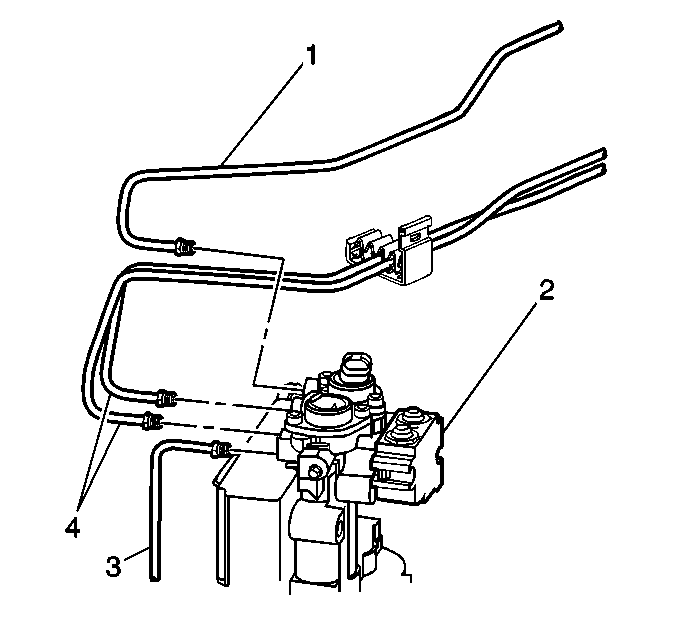Removal Procedure
- Remove the battery. Refer to Battery Replacement in Engine Electrical.
- Remove the battery tray.
- Remove the air cleaner assembly. Refer to Air Cleaner Assembly Replacement in Engine Controls-2.4L.
- Disconnect the brake pipe (1) from the brake modulator assembly (2).
- Raise the vehicle. Refer to Lifting and Jacking the Vehicle in General Information.
- Remove the tire and wheel. Refer to Wheel Removal in Tires and Wheels.
- Disconnect the brake pipe (1) from the brake hose.
- Disconnect the retainers as needed.
- Remove the brake pipe (1).

Caution: Unless directed otherwise, the ignition and start switch must be in the OFF or LOCK position, and all electrical loads must be OFF before servicing any electrical component. Disconnect the negative battery cable to prevent an electrical spark should a tool or equipment come in contact with an exposed electrical terminal. Failure to follow these precautions may result in personal injury and/or damage to the vehicle or its components.
Installation Procedure
Caution: Always use double-walled steel brake pipe when replacing brake pipes. The use of any other pipe is not recommended and may cause brake system failure. Carefully route and retain replacement brake pipes. Always use the correct fasteners and in the original location for replacement brake pipes. Failure to properly route and retain brake pipes may cause damage to the brake pipes and brake system resulting in personal injury.
- Fabricate a new brake pipe. Refer to ISO Flares Replacement .
- Install the brake pipe (1) to the vehicle.
- Loosely install the brake pipe nut to the brake hose.
- Lower the vehicle.
- Loosely install the brake pipe nut to the brake modulator assembly (2).
- Install the brake pipe retainers.
- Install the tire and wheel. Refer to Wheel Installation in Tires and Wheels.
- Install the battery tray.
- Install the battery. Refer to Battery Replacement in Engine Electrical.
- Install the air cleaner assembly. Refer to Air Cleaner Assembly Replacement in Engine Controls-2.4L.
- Bleed the brake system. Refer to Hydraulic Brake System Bleeding .

Notice: Use the correct fastener in the correct location. Replacement fasteners must be the correct part number for that application. Fasteners requiring replacement or fasteners requiring the use of thread locking compound or sealant are identified in the service procedure. Do not use paints, lubricants, or corrosion inhibitors on fasteners or fastener joint surfaces unless specified. These coatings affect fastener torque and joint clamping force and may damage the fastener. Use the correct tightening sequence and specifications when installing fasteners in order to avoid damage to parts and systems.
Tighten
Tighten the brake pipe nuts to 7 N·m (20 lb ft)
